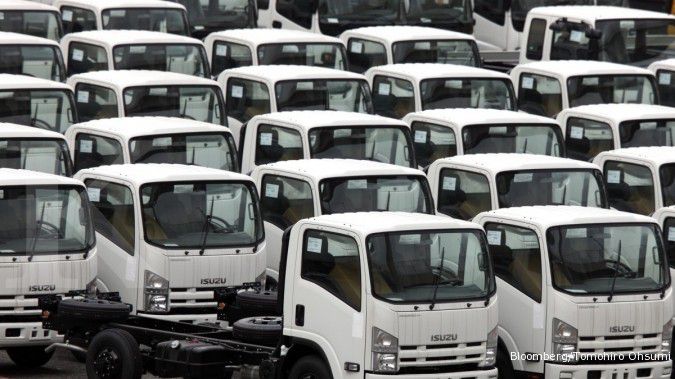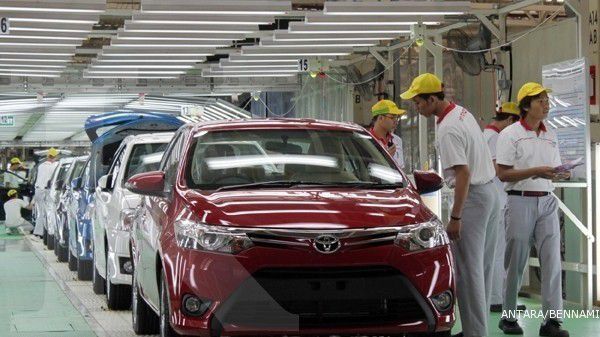KARAWANG. Japanese automaker Isuzu Astra Motor Indonesia (IAMI) officially opened on Tuesday the company’s new commercial vehicle assembly plant in the Karawang industrial area, West Java, to tap into rising demand both in domestic and export markets.
With the operation of the new plant, Indonesia has become Isuzu’s third global production hub after Japan and Thailand, IAMI’s president director Yohannes Nangoi said after the inauguration of the new plant, which was also attended by Industry Minister Saleh Husin and Trade Minister Rachmat Gobel.
He said the new plant, which has an annual production capacity of 52,000 units of commercial trucks a year, comprising 42,000 units of Isuzu Elf light trucks and 7,000 units of Isuzu Giga mid-sized trucks, replaced the operation of the company’s first truck assembly plant in Pondok Ungu, East Jakarta.
According to Yohannes, the Pondok Ungu plant, which was opened in 1997, was closed because it was no longer able to accommodate expansion. IAMI has invested Rp 1.7 trillion (US$130.6 million) to build the Karawang plant.
IAMI’s production director Ary M. Sumampouw said that in producing its trucks, the company used 40 percent locally produced components sourced from small- and medium-sized enterprises (UMKM).
Isuzu has operated in Indonesia since 1960 to provide commercial vehicles to support the developing economy. The increasing need for commercial vehicles in Indonesia has pushed the Pondok Ungu plant to its maximum capacity.
Yohannes said that with the operation of the new plant, the company was expected to be able to export completely built-up (CBU) trucks beginning next year. At present, the company exports 250,000 block engines mostly to Thailand and Japan.
He hoped that by next year the company could export at least 20 percent of the total production in the form of CBU trucks.
Yohannes also told reporters that Isuzu’s production bases were situated in three countries, namely Japan, which produces commercial vehicles for developed countries, Thailand, which focuses on small trucks, and Indonesia, for the production of light and midsize trucks.
Meanwhile, in his speech at the event, Minister Saleh hoped Isuzu would be able to export half of the new plant’s production in order to help increase the country’s foreign exchange earnings.
He said the increase in export earnings would help reduce Indonesia’s current account deficit, which has been under pressure recently due to the decline in the country’s total exports.
Indonesia becomes Isuzu’s third global hub
April 08, 2015, 12.08 PM
/2015/04/07/1542912591p.jpg)
ILUSTRASI. Indeks harga saham gabungan atau IHSG menguat ke level 6.834 pada penutupan Rabu (25/8)
Source: The Jakarta Post
| Editor: Hendra Gunawan
Latest News
-
February 07, 2026, 04.59 PM
Indonesian Comedian Summoned by Police Over Netflix Show
-
February 07, 2026, 05.57 AM
GLOBAL MARKETS-Stocks, Bitcoin Rally, Regaining Some Lost Ground with Precious Metals
-
February 06, 2026, 07.58 AM
Indonesian Markets Face More Pressure after Moody's Cuts Outlook
-
February 05, 2026, 07.19 PM
Moody's Cuts Indonesia's Sovereign Rating Outlook to Negative
-
February 05, 2026, 02.43 PM
Indonesia Posts Fastest Economic Growth Rate in Three Years
-
February 04, 2026, 04.38 PM
Indonesia's Tax Revenues Jump in January, Finance Minister Says
-
February 04, 2026, 03.34 PM
AUD 1.6 Trillion Australian Pension Funds Ready to Pour into Indonesia
-
February 04, 2026, 02.13 PM
Indonesian Miners Halt Spot Coal Exports Over Proposal to Cut Output
-
February 04, 2026, 12.39 PM
Emerging Asia Stocks Waver as AI Selloff Bites, Seoul Hits Record High











